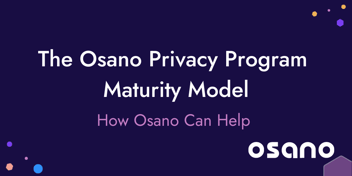
How Osano Can Help
How Osano Can Help You Mature Your Privacy Program Building, running,...
Read NowGet an overview of the simple, all-in-one data privacy platform
Manage consent for data privacy laws in 50+ countries
Streamline and automate the DSAR workflow
Efficiently manage assessment workflows using custom or pre-built templates
Streamline consent, utilize non-cookie data, and enhance customer trust
Automate and visualize data store discovery and classification
Ensure your customers’ data is in good hands
Key Features & Integrations
Discover how Osano supports CPRA compliance
Learn about the CCPA and how Osano can help
Achieve compliance with one of the world’s most comprehensive data privacy laws
Key resources on all things data privacy
Expert insights on all things privacy
Key resources to further your data privacy education
Meet some of the 5,000+ leaders using Osano to transform their privacy programs
A guide to data privacy in the U.S.
What's the latest from Osano?
Data privacy is complex but you're not alone
Join our weekly newsletter with over 35,000 subscribers
Global experts share insights and compelling personal stories about the critical importance of data privacy
Osano CEO, Arlo Gilbert, covers the history of data privacy and how companies can start a privacy program
Upcoming webinars and in-person events designed for privacy professionals
The Osano story
Become an Osanian and help us build the future of privacy!
We’re eager to hear from you
Interested in partnering with us?
Increase Trust. Stay Compliant. Get Cool Swag.
Inquiries and Osano in the news
Add Osano data privacy ratings and recommendations to your application
.webp?width=1220&height=1090&name=Osano-guarantee-seal%20(1).webp)
Benchmark and Grow Your Organization’s Privacy Program
Data privacy impact assessments (DPIAs) and other privacy risk assessments are essential exercises for identifying sources of privacy risk. With a healthy assessment process, you can identify when these risks can be mitigated, when they are unacceptably high, and when they are tolerable. Regular assessments of this type encourage privacy by design, as they force stakeholders to consider privacy risks before beginning a project or initiative.
Please note that we use the term privacy impact assessment to cover any assessment that identifies and quantifies privacy risk, such as GDPR-mandated DPIAs and the privacy impact assessments required under some U.S. laws.
At the least mature level, your organization may not be conducting privacy impact assessments at all—instead, you might only consider those privacy risks that are immediately apparent and may not take thorough steps to mitigate those risks.
Relevant stakeholders may not be alerted to privacy risks, and ultimately, your organization will launch initiatives that introduce unwarranted risks to personal data. This can result in privacy breaches and legal or reputational damage to the organization.
In contrast, a mature privacy impact assessment process involves a systematic and comprehensive analysis when there is a high degree of privacy risk associated with all projects or initiatives that involve personal data processing. Your assessments will identify:
You’ll involve stakeholders and subject matter experts in the process and mitigate identified privacy risks through the use of appropriate safeguards. Moreover, you’ll have a process in place to ensure the overall assessment workflow functions smoothly.
That includes understanding how well your assessment identifies privacy risks and mitigation techniques, that it’s conducted at the right time and without unnecessary delays, and that stakeholders are consulted throughout the project lifecycle.
To further mature the privacy assessment process, consider whether you’ve taken the following actions:
With Osano, building, managing, and scaling your privacy program becomes simple. Schedule a demo or try a free 30-day trial today.